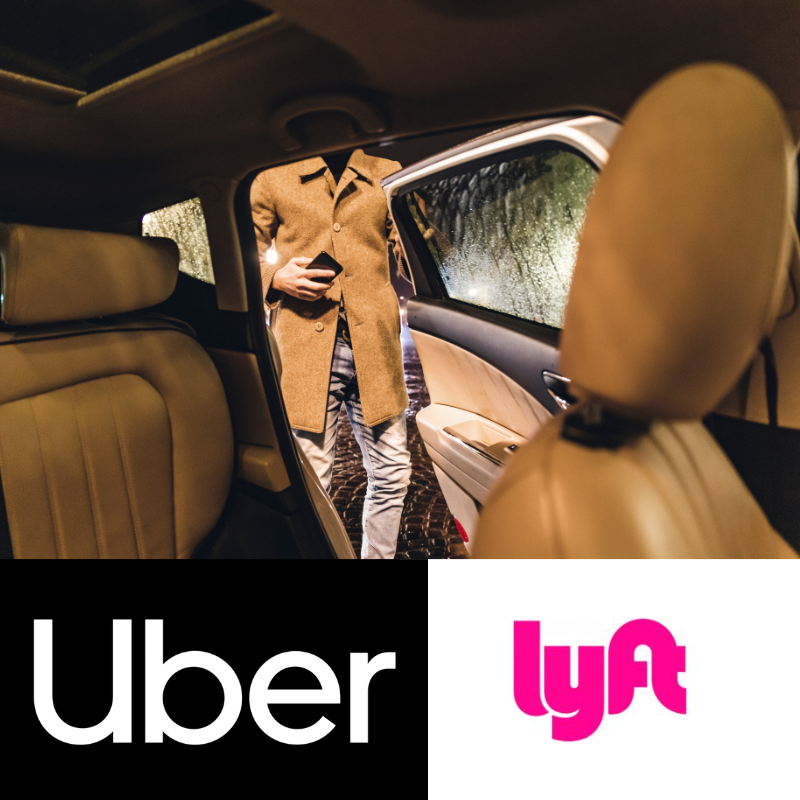Uber / Lyft Sexual Assault Claims
The Latest Developments on Uber Sexual Assault Lawsuits
Since its inception in 2009, Uber has been linked to a significant number of sexual assault cases involving passengers. Despite the rising concern for passenger safety, the company has faced criticism for not implementing stringent measures to vet their drivers thoroughly.
Uber and Lyft are responsible for ensuring the safety of their users. However, the necessary steps to improve safety protocols on these apps or decisively remove drivers with a record of misconduct have not been sufficiently taken.
Uber and Lyft Under Fire: The Growing Legal Storm Over Passenger Safety Concerns
Ridesharing services like Uber and Lyft have overtaken traditional taxi services across the United States. Millions of Americans turn to these platforms daily for their transportation needs.
Amidst their popularity, Uber and Lyft have received thousands of complaints and legal actions. These legal claims argue that Uber and Lyft are at fault for thousands of sexual assaults due to their inadequate vetting of drivers.
The issue has escalated recently, with a significant surge in lawsuits presenting similar claims against Uber and Lyft across the country.
Uber sexual assault claims have been consolidated into a lawsuit known as “In re: Uber Technologies Inc., Passenger Sexual Assault Litigation (MDL No. 3084)”. This consolidated lawsuit includes over 230 plaintiffs as of April 1, 2024. It is expected to expand as more people come forward.
These developments underscore a critical conversation about safety measures, accountability, and rideshare companies’ responsibilities to ensure the well-being of their passengers.
They also highlight the importance of continuous improvement in safety protocols and implementing more stringent driver screening processes to protect passengers and prevent future incidents.
What is the Uber sexual assault lawsuit about?
The lawsuits surrounding Uber center on multiple allegations of sexual assault and harassment by its drivers, as reported by numerous passengers. Lawsuits against Uber charge that despite being aware of such accusations, the company:
- It did not establish appropriate safety protocols aimed at safeguarding its passengers.
- Neglected to thoroughly vet its drivers, skipping essential steps like fingerprint verification.
- Permitted individuals with a documented history of misconduct to remain active on the platform.
To address these serious concerns, Uber, a ridesharing service with over one million drivers, must institute comprehensive background checks and take decisive measures to elevate the standard of safety for every passenger.
How many Uber passengers have been sexually assaulted by drivers?
Since 2017, Uber has received over 9,000 reports of driver sexual misconduct and rape. Hundreds of lawsuits have been filed against Uber due to allegations of sexual assault by Uber drivers.
Lyft released a U.S. safety report in 2021, a year before the Uber report. The data reported that 4,158 passenger-reported claims of driver-initiated sexual assault occurred between 2017 and 2019.
The exact count of such incidents remains uncertain since numerous passengers might not officially report the assaults for many reasons. We encourage all victims of Uber and Lyft sexual assaults to come forward and be heard. Your voice matters, and we will help you seek the justice you deserve.
With the ongoing legal proceedings against Uber, more individuals are expected to come forward to present their cases.
Rideshare Risks: Protecting Intoxicated Friends from Uber & Lyft Assaults
In many Uber and Lyft assault cases, victims are often intoxicated individuals. Please think twice about putting a friend who is intoxicated into an Uber or Lyft. It could lead to a dangerous situation. It is important to think about how to be safe with Uber.
We want to emphasize that being intoxicated does not justify a rideshare driver violating your consent. Intoxication impairs the ability to give proper consent. If you believe you’ve experienced sexual assault by an Uber or Lyft driver, we’re here to assist you.
Unfolding Allegations and Legal Battles Over Uber Sexual Assault Claims
Here is an updated chronology of the sexual assault allegations against Uber. Ongoing legal actions around these accusations are still unfolding. Stay tuned for future updates on the situation.
October 30, 2024: Magistrate Judge Lisa J. Cisneros has recently addressed a dispute concerning a subpoena issued to Lyft as part of the ongoing Uber passenger sexual assault litigation. The plaintiffs request that Lyft provide information on its employees involved in the Industry Sharing Safety Program (ISSP) with Uber, ensuring these individuals have a direct role in the program.
Lyft must identify these key employees by November 8, 2024, if confirmed before this date, and must discuss with the plaintiffs if there are disputes over the chosen custodians.
Additionally, there’s contention over Uber’s request to examine Lyft’s documents for sensitive information. The plaintiffs argue that confidentiality is waived since these communications involve a third party, making review unnecessary and burdensome.
Lyft plans to conduct a thorough process of selecting relevant individuals and intends to meet the final production deadline of December 17, 2024. Lyft claims that Uber might have a right to keep some communications private because they share an interest in safety-related data.
Judge Cisneros ruled that Uber can perform this review, but all non-confidential documents and privilege logs must be provided by December 17.
October 16, 2024: New Uber Sexual Assault Lawsuit – A plaintiff from New Jersey has filed a lawsuit claiming sexual assault by Uber drivers during rides booked through the Uber app in January and July 2023. The lawsuit, submitted in a simplified format as permitted by the MDL case management procedures, seeks compensatory and punitive damages and a jury trial.
October 9, 2024: Uber tried to retrieve documents it claimed were accidentally shared and should be kept private under attorney-client privilege. Uber wanted three documents and their attachments back, saying they were part of legal advice from their in-house lawyers.
The plaintiffs opposed Uber’s claims in two emails and a “Safety Criteria Update Comms Plan,” stating that these were created before involving any lawyers and weren’t privileged from the start. Big companies often claim privilege without a solid basis.
After reviewing the arguments and a hearing, the court decided the “Safety Criteria Update Comms Plan” wasn’t protected, as it was made for policy decisions, not legal advice. Bringing in lawyers later didn’t make it privileged. The court denied Uber’s request to return this document but asked both parties to discuss and settle disputes about the email attachments by October 16, 2024.
September 30, 2024: The number of Uber driver sexual assault cases in the MDL grew by 83 in September, totaling 1,346.
April 9, 2024: A lawsuit in Delaware federal court accuses Uber of misleading the public about its platform’s safety in official filings and ads. The suit, filed by shareholders—not victims—alleges that Uber’s leadership knew of over 9,000 sexual assault reports against drivers from 2017 to 2020. This alleged misrepresentation supposedly inflated Uber’s stock prices, benefiting company insiders via equity trades. CEO Dara Khosrowshahi and former CFO Nelson Chai are named as defendants, reportedly earning millions from compensation and insider trading during this period. Additionally, Uber is dealing with over 400 lawsuits tied to passenger assaults or harassment.
April 3, 2024: Uber has requested the MDL judge to dismiss claims from Texas plaintiffs, arguing that Texas law does not hold it responsible for individual drivers’ actions. They emphasize that the 17 claims lack enough evidence. Uber’s stance is that, under Texas law, it isn’t vicariously liable for drivers’ misconduct, like sexual assaults, as these acts fall outside job duties and don’t serve the company’s interests. Additionally, Uber disputes using the non-delegable duty doctrine for intentional torts such as sexual assault, noting the plaintiffs haven’t shown Uber delegated its duties to drivers. However, this argument overlooks the MDL’s focus on Uber’s insufficient safety measures, suggesting profit was prioritized over passenger safety.
April 1, 2024: The class action lawsuit involving Uber drivers and allegations of sexual assault now comprises 230 active cases. Since the beginning of the year, 43 cases have joined the Multi-District Litigation (MDL), highlighting the growing concerns surrounding this issue.
March 22, 2024: The judge overseeing the MDL (multidistrict litigation) has issued a detailed order regarding how fact sheets from both plaintiffs and defendants are to be handled in the Uber Passenger Sexual Assault Litigation.
This order outlines the specific format, deadlines, and procedures for submitting these fact sheets, which are crucial for the ongoing litigation process in this MDL.
The directive outlines:
- critical dates for the submission of fact sheets
- specifies standards for their accuracy and delivery
- details the protocol for managing private data and disagreements
- mandates the disclosure of ride receipts
- defines the requirements for obtaining permissions to release records.
This structure is intended to streamline the litigation process, highlight shared issues, and assist in choosing representative cases for trial. It also allows for agreed-upon modifications to the directive or fact sheets by March 25, 2024.
March 6, 2024: A U.S. Magistrate Judge involved in the legal proceedings for sexual assault lawsuits against Uber has issued an order for the rideshare company to submit documents tied to governmental probes into sexual misconduct allegations concerning its drivers.
The complainants have raised concerns that Uber still needs to fully reveal these essential documents, especially those related to the California Public Utilities Commission (CPUC) investigations.
The court has ordered Uber to submit all records related to the investigation in California by March 8, 2024. Additionally, the judge has called for a more detailed explanation from the plaintiffs about whether the investigations in Los Angeles and San Francisco are subject to discovery, with their responses expected by March 11, 2024.
February 27, 2024: A federal judge in Connecticut has dismissed an attempt by Lyft to throw out a lawsuit stemming from an incident where a 14-year-old girl, referred to as Jane Doe, was transported out of state by a Lyft driver and subsequently sexually abused.
The ruling permits Doe’s family to update their lawsuit against the company, including allegations of Lyft and its driver’s failure to verify the passenger’s age, leading to her being taken to New York where the abuse occurred.
The family’s argument pointed out the driver’s lack of due diligence. It noted that despite the girl’s obviously young appearance—clad in pajamas and a hoodie and carrying a backpack—he did not question her age and proceeded to transport her across state lines.
The judge deemed the revised complaint as timely and justified, especially criticizing the driver’s inability to recognize the signs that Doe was underage.
Additionally, the judge refuted Lyft’s defense that the driver was not performing his job duties during the incident. This was based on Lyft’s policy, which prohibits minors from using its service unaccompanied, suggesting that the company should be aware of the risks involved.
February 15, 2024: The lawsuit consolidated in a significant legal action, pointing to a serious accusation at Uber. It claims that Uber has been aware for almost ten years that some of its drivers were committing sexual assaults against passengers but failed to take strong measures to stop these crimes.
What does this mean in simpler terms? All individual complaints from victims have been combined into one big lawsuit document, making it clearer and stronger. The MDL outlines the common problems these victims faced and demands justice for them collectively. This method helps highlight the main issues at hand.
The lawsuit’s core argues that Uber knew about these assaults since 2014 but chose company growth and profits over the safety of its customers. It allegedly did not implement more rigorous safety checks, such as fingerprint verification, cameras inside cars, or better background checks for drivers.
The complaint also accuses Uber of not taking stronger actions against drivers who had histories of sexual misconduct and seeks both compensation for the victims and additional penalties against Uber.
This overview is meant to raise public awareness about the serious accusations against Uber and the legal actions being taken to address these issues.
February 2024: Uber attempted to persuade a judge to put a pause on nearly 400 lawsuits filed by passengers who reported being sexually assaulted by drivers using the rideshare service. These cases were grouped together in a legal process known as “centralization” by a special panel, a move Uber disagreed with.
October 2023: Multiple Uber sexual assault allegations have been combined into a single federal multidistrict litigation (MDL) case, overseen by Judge Charles Breyer in the Northern District of California, following court orders.
August 2022: In the San Francisco County Superior Court, 550 individuals brought lawsuits against Uber, alleging incidents of sexual assault and harassment. And an additional 150 potential cases are being investigated related to accusations of Uber sexual assault.
July 2022: Lyft has faced 17 new legal claims from passengers and drivers, alleging that the company did not take necessary measures to guarantee safe journeys. Furthermore, the plaintiffs assert that Lyft provided insufficient support or follow-up to victims who reported episodes of assault.
June 2022: In the wake of allegations against Lyft, a settlement of $25 million was reached with shareholders. The lawsuit accused the company of not disclosing safety concerns before its initial public offering.
December 2021: The California Public Utilities Commission and Uber reached a $9 million settlement over the company’s failure to provide information about safety violations.
March 2018: Seven additional women came forward to join the plaintiffs in the lawsuit against Uber concerning assaults, which was originally filed in November 2017.
November 2017: A class-action lawsuit was initiated by two women against Uber, accusing the rideshare company of neglecting to implement thorough driver vetting processes. This oversight, they argued, led to the establishment of an insecure system that permits individuals with violent histories to easily come into contact with unsuspecting passengers.
November 2016: Uber settled the lawsuit with two women, who chose to remain anonymous, after they alleged sexual assault by drivers, thus preventing the case from going to trial.
October 2015: two women filed A lawsuit against Uber in the U.S. District Court of San Francisco. They alleged that the company did not ensure the safety of its passengers, claiming they had been sexually assaulted during rides with the service.
How do you determine damages in a rideshare sexual assault lawsuit?
Sexual assault cases involving rideshare companies like Uber and Lyft have been on the rise in recent years, leaving victims seeking justice and compensation for the trauma they have endured.
If you are considering filing a lawsuit against Uber for a sexual assault that occurred during a ride, it is important to understand the steps involved in determining settlement compensation or jury awards.
- Seek Legal Counsel: The first step in determining settlement compensation or jury awards in a sexual assault lawsuit against Uber or Lyft is to seek out an experienced sexual assault lawyer who focuses on these types of cases. A knowledgeable legal professional can guide you through the legal process, advocate on your behalf, and ensure you receive the compensation you deserve.
- Gather Evidence:To build a strong case against Uber, it is essential to gather all relevant evidence related to the sexual assault incident. This may include witness statements, medical records, police reports, and any communication with Uber regarding the incident.
- Assess Damages: Your attorney will work with you to assess the damages resulting from the sexual assault, including the severity of the assault, physical injuries, emotional and psychological trauma, medical expenses, including trauma therapy, and other losses suffered as a result of the assault.
Navigating Legal Battles Against Uber/Lyft Assaults
Our experienced team of attorneys has a proven track record of success in handling cases involving sexual assault. We are well-versed in the complex legal issues surrounding these types of claims and will work tirelessly to ensure you receive the compensation and support you deserve.
Our goal is to secure financial compensation for our clients and help them find closure and healing in the aftermath of such a traumatic experience.
If you are considering pursuing legal action against an Uber or Lyft driver who has sexually assaulted you, it is crucial to seek out representation from a law firm with experience in this area.
The Yost Legal Group has a deep understanding of the unique challenges faced by survivors of sexual assault. We will provide you with compassionate and comprehensive legal guidance throughout your case. We will fight vigorously on your behalf to ensure that justice is served.
Seeking Justice for Victims of Sexual Assault by Uber and Lyft Drivers
It is an unfortunate reality that some individuals who work as Uber and Lyft drivers take advantage of their positions of trust and authority to commit acts of sexual assault against unsuspecting passengers.
These incidents can have devastating effects on passengers, causing emotional trauma, financial hardship, and lasting psychological damage.
At The Yost Legal Group, we understand the profound impact sexual assault has on survivors. We are dedicated to holding Uber and Lyft accountable for their drivers actions.
If you or someone you know is a survivor of sexual assault by an Uber or Lyft driver, contact us at 800-967-8529 for a free confidential consultation.
The Yost Legal Group is committed to fighting for justice on behalf of survivors. You do not have to face this difficult situation alone.
VIEW BLOG POSTS RELATED TO SEXUAL ABUSE CLAIMS




